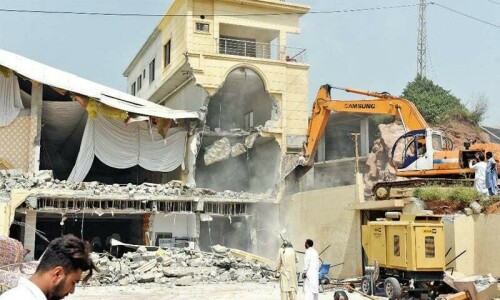KARACHI: Expressing concern over the recent outbreak of Congo fever reported at a government-run hospital in Quetta, experts on Sunday stated that the precious lives lost to the disease could have been saved if patients were provided timely proper treatment back in Balochistan where an acute shortage of health facilities forced several attendants to rush their loved ones to distant Karachi by endangering their own lives.
The recent episode, they pointed out, also underscored the need for strictly enforcing infection control practices in hospital settings and implementing preventive measures in handling livestock.
More than a dozen patients — most of them healthcare providers — have been shifted to Karachi since Nov 5 following the outbreak of Congo Crimean Haemorrhagic Fever (CCHF) reported at Sandeman Provincial Hospital in Quetta in the last week of October.
The fever broke out, according to Balochistan government officials, after an under treatment patient tested positive for the CCHF. He was later shifted to the Fatima Jinnah Hospital in Quetta.
Dr Salahuddin says transporting CCHF patients along with family should be strongly discouraged
So far, nine patients out of the 16 admitted to a private hospital in Karachi, have recovered while three patients, including a doctor, have succumbed to the illness.
Twenty-seven-year-old Dr Shakrullah died while being shifted to Karachi. One of his attendants, Dr Sarfaraz, sources said, had also contracted the infection while taking care of his critically ill colleague.
Sources said the latest victim, who was a ward boy at the Quetta hospital, died soon after his arrival at the Sindh Infectious Disease Hospital and Research Centre in Karachi (SIDHRC) on Nov 6.
“He had reported to us a history of rectal bleeding and extremely low oxygen saturation level. He died within a few hours of his arrival despite intensive efforts,” SIDHRC Medical Superintendent Dr Abdul Wahid Rajput said, adding that at least nine of the 10 hours of critical time had been lost when he reached the hospital in Karachi from Quetta.
According to him, patients in critical condition should have been provided an air ambulance and that the CCHF patients should have received the treatment in Quetta as carrying such patients to another place involved high infection risk for attendants.
“The treatment for the CCHF doesn’t involve any surgical intervention or use of special technology. It’s primarily supportive and includes careful attention to fluid balance and correction of electrolyte abnormalities and oxygenation, if required, and infection prevention control,” he explained, adding that the patients needed to be kept in isolation units.
Dr Naseem Salahuddin, heading the infectious disease department at the Indus Hospital, emphasised that transporting the CCHF patients along with family and without proper personal protective equipment was itself a hazard and should be strongly discouraged.
“Infection patients shouldn’t be transported to other cities, rather they should be given full support in their own cities with proper training and provision of necessary equipment,” she said.
In his opinion, Dr Rafiq Khanani, representing the Infectious Diseases Society of Pakistan, said eighty per cent of Congo fever patients recovered without showing signs of illness.
“But they can infect others through their body secretions and infectious blood. Since the CCHF is a zoonotic infection, precaution in handling cattle is the only way to prevent the infection.”
Explaining the circumstances which forced healthcare providers to shift their infected colleagues to Karachi, Dr Attal Khan of the Young Doctors Association-Balochistan stated that intensive care facilities in Quetta were gravely limited.
“While Quetta has five tertiary care hospitals in the public sector, there is only one (full-fledged) intensive care unit in the whole city at Fatima Jinnah Hospital. The facility was fully occupied at that time,” he said, adding that there was no tertiary care hospital in the rest of the province.
“In the case of an outbreak, we can’t manage patients. The problem has been raised with the government multiple times, but to no avail.”
Dr Waseem Baig, representing the Balochistan health department, however, said that there were three ICUs at as many hospitals in Quetta.
“We can’t force people to get treatment here. The department facilitated all the CCHF patients who wanted to get treatment in Karachi.”
Published in Dawn, November 13th, 2023















































Dear visitor, the comments section is undergoing an overhaul and will return soon.